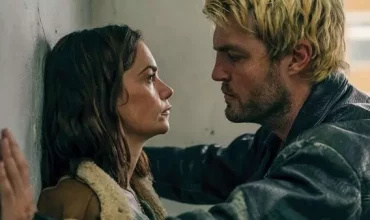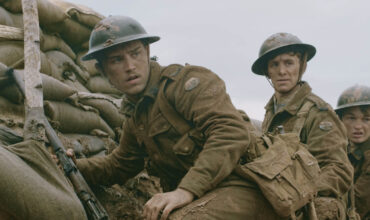It is 1976, and Maurice Flitcroft (Mark Rylance), a crane driver in his mid-40s, is being made redundant at the Vickers Armstrong shipyard in Barrow-in-Furness (Cumbria, England). His wife Jean (Sally Hawkins) encourages him to pursue his dreams. When Maurice was a boy he loved books, painting and languages, but was prevented from following these paths. Now, he is a middle-aged man who has a step-son in his 20s and two teenage boys and he feels the responsibility to support his family. One day, after a period of reflection he decides that professional golf is a life he wishes to follow. For both dream fulfilment and financial reasons. He sources a hat, some boots and he enters the 105th Open Championship at Royal Birkdale Golf Club in Southport.
Maurice’s unconventional playing techniques prevent him from winning, but there is something about his attitude and scoring that captures the public’s attention. Thanks to some smart-aleck media, he even earns the nickname The World’s Worst Golfer. This not only affects him emotionally, but also the way his family view him. His stepson Michael (Jake Davies) has a management job at the shipyard and as the word gets around about the elder Flitcroft’s activities, Michael feels embarrassed. His step-father’s odd journey doesn’t match up with the type of upscale, middle-class life that Michael wants for himself. Maurice’s younger sons, the twins, Gene (Christian Lees) and James (Jonah Lees) are more supportive at first, agreeing to caddy for him. However, as Maurice’s fame spreads, the whole family suffers ridicule from strangers in their community.
Maurice pledges to improve his game, but to do so he must become a properly accredited professional. And the powers-that-be, behind UK’s professional golf clubs, work to exclude him from tournaments and golf courses. Undeterred, he continues to make try any move he can to practice and to play. This includes training in bad weather and even using a pseudonym to enter tournaments.
THE PHANTOM OF THE OPEN is a biography based on the life and times of the real Maurice Flitcroft. It is adapted from the book The Phantom of the Open: Maurice Flitcroft, The World’s Worst Golfer. The book is work of Scott Murray and Simon Farnaby. The screenplay was written by Farnaby and directed by Craig Roberts. The end-result is a comedy drama that has ideas in common with British fare such as THE FULL MONTY, BILLIE ELLIOT and EDDIE THE EAGLE with some light surrealism swirled in. As with practically all British cinema, class differences are pointed up and we are supposed to side 100% with the working-class dreamer Maurice Flitcroft. And we are supposed to hiss at the posh folk who will always try to keep down the ordinary man. The message is fine, but here it is laid on with a heavy hand in some scenes.
Mark Rylance plays the lead role to perfection. His responses to set backs and humiliation is to keep moving forward. Rylance embodies a man who has grown used to putting the needs of others before his own. The idea we are presented with is this: you can view Maurice as an unrealistic man who hoaxes as poorly as he golfs, or he is someone who has finally set himself free.
Sally Hawkins does a lovely job as the supportive Jean. I am ready to see her play a weirdo again, but her performance plays off Rylance’s beautifully. You buy these two as a long-time married couple who love and support each other. The Lees brothers make an impact as the disco champ twins who will dance at almost any opportunity. Writer Simon Farnaby is an actor well known for his work in TV’s HORRIBLE HISTORIES, GHOSTS and other comedies. He has a small role here as a professional French golfer. Craig Roberts does a solid job whipping all these elements into a shape.
THE PHANTOM OF THE OPEN is a gentle, charming comedy with Mark Rylance delivering a central performance that has your attention in every scene. Running Time: 102 minutes. Rating: (8/10)
NOTE: Darran’s Accessreel interview with Mark Rylance is available at this link.


